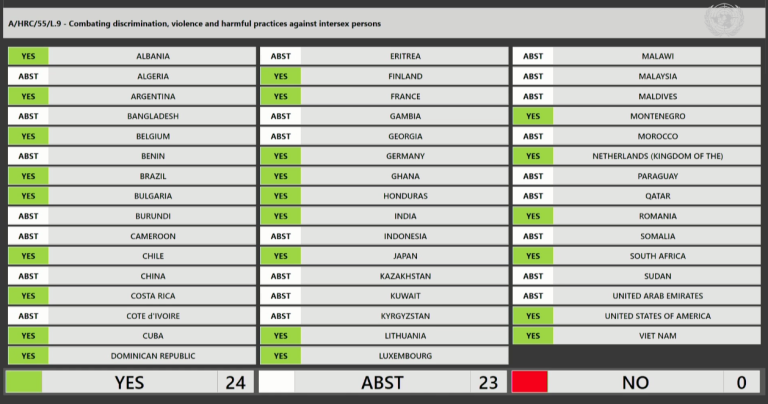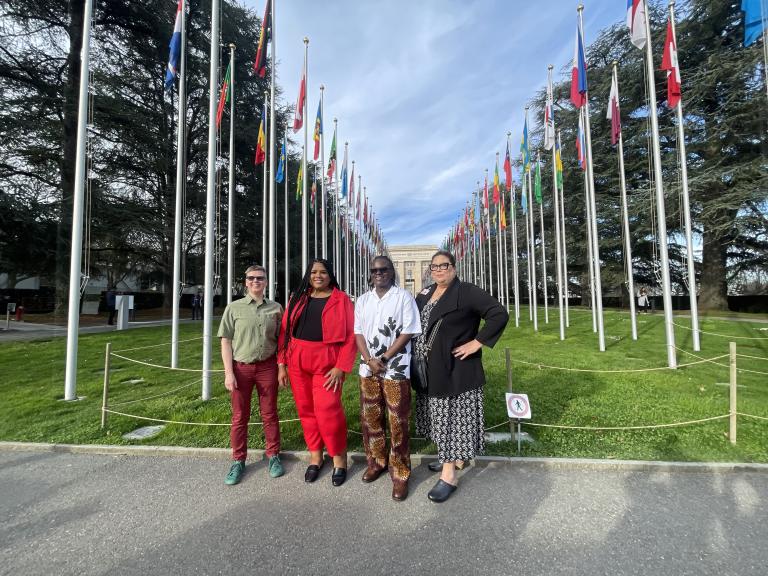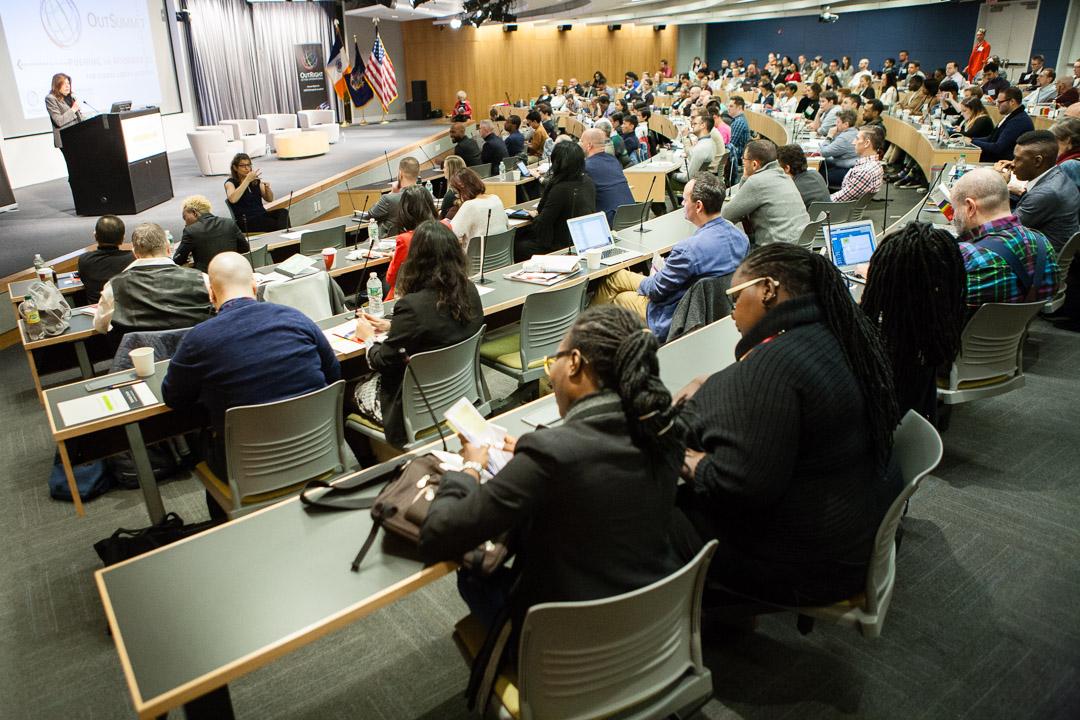
Press Release
United Nations addresses the human rights of intersex persons in ground-breaking resolution
Geneva, 4 April 2024 – The United Nations made a historic move to protect the human rights of intersex persons, 35 civil society organisations said today, as the Human Rights Council adopted its first-ever resolution specifically addressing discrimination, violence, and harmful practices against persons with innate variations in sex characteristics. A majority of States voted in favour of the resolution, with no States voting against it.
The resolution – brought by Finland, South Africa, Chile, and Australia – encourages States to “work to realise the enjoyment of the highest attainable standard of physical and mental health” for intersex people. It also requests the Office of the High Commissioner to prepare a report – to be discussed at the Human Rights Council in September 2025 - examining “discriminatory laws and policies, acts of violence and harmful practices, in all regions of the world,” and looking at “best practices including legal protection and remedies” for persons with innate variations in sex characteristics.

The voting record for the intersex resolution at the 55th UN Human Rights Council.
“This resolution marks yet another milestone in how international bodies are looking at the rights of intersex persons,” the 35 organisations said. “Over the years, the work of civil society and States alike has built tremendous momentum, but things could take an even more decisive turn this time. Thanks to this vote, the first-ever official United Nations report to address the human rights situation of persons with innate variations in sex characteristics will raise awareness of the issue in a way that States can no longer ignore, and will have to act upon.”
The document adopted by the Council expressed “grave concern” about violence and harmful practices facing persons with innate variations in sex characteristics - including medically unnecessary or deferrable interventions concerning sex characteristics. It also recognised how its call to action builds upon statements made by multiple human rights bodies and the commitments of the Sustainable Development Goals - especially Goal 3 on Good health and well-being.

Intersex advocates standing in front of the United Nations in Geneva.
“We are grateful to the cross-regional group of States who brought this resolution forward, those who supported it, and the growing number of countries that have started to enhance protections for intersex persons,” the 35 organisations continued. “Intersex people exist in every part of the world. And yet, they continue to face pervasive human rights violations everywhere – including forced and coercive medical interventions, infanticide, denial of legal recognition and registration at birth, and discrimination in accessing health, education, and sports, amongst others. The importance of the United Nations addressing this situation to better the lives of intersex people worldwide cannot be overstated.”
This is a joint statement by:
Ação Pela Identidade – API; African Intersex Movement; Beyond the Boundary-Knowing and Concerns Intersex (Hong Kong); Campaign for Change (CfC) (Nepal); Fundacja Interakcja (Poland); ILGA World; Intersex Asia; Intersex Community of Zimbabwe (ICoZ); Intersex Human Rights Australia; Intersex Human Rights India; Intersex Kenya Education and Advocacy (IKEAA); Intersex Movement Ghana / Key Watch Ghana; Intersex Nigeria; Intersex Persons’ Implementation Coordination Committee (IPICC); Intersex Persons’ Society of Kenya (IPSK); Intersex Philippines; Intersex Thailand; Intersex Society of Zambia (ISSZ); Intersex South Africa; Intersex Uganda; Intersex Venezuela; Intersexions; Intersexo Brasil; ISIO Intersex Human Rights Finland; Iranti; Justicia Intersex (Argentina); Kenya National Commission on Human Rights (KNCHR); Mulabi / Latin American Space for Sexuality and Rights; OII Chinese; OII Europe; Omoro Alliance for Empowerment Foundation (ALEFA); Outright International; Support Initiative for People with Congenital Disorders (SIPD) Uganda; Tanzania Voice of Humanity; Voice of Togetherness Uganda
Intersex people have innate variations of sex characteristics (such as genitals, reproductive organs, hormonal and chromosomal patterns) that are more diverse than stereotypical definitions of male or female bodies. Up to 1.7% of the global population is born with such traits, and the fact that someone is intersex can become apparent at different times in their life. Because their bodies are seen as different, intersex children and adults are often stigmatised and subject to harmful practices – including in medical settings – and discriminated against.
Number of votes for the resolution
- In favour: 24
- Against: 0
- Abstentions: 23
List of States co-sponsoring the resolution
Albania; Australia; Austria; Belgium; Brazil; Canada; Chile; Colombia; Cyprus; Czechia; Denmark; Ecuador; Estonia; Finland; France; Germany; Greece; Iceland; Ireland; Israel; Kenya; Latvia; Lithuania; Luxembourg; Malta; Mexico; Montenegro; Netherlands; New Zealand; North Macedonia; Norway; Panama; Portugal; Republic of Korea; Romania; San Marino; Slovenia; South Africa; Spain; Sweden; Ukraine; United Kingdom; United States Of America; Uruguay.
- 2015: the OHCHR convenes the first Intersex Expert meeting
- 2016: a group of UN human rights experts and mechanisms joins forces with the African Commission on Human and Peoples’ Rights, the Inter-American Court on Human Rights and the Council of Europe, urging to end violence and harmful medical practices on intersex children and adults
- 2019: OHCHR publishes a background note focusing on human rights violations against intersex people
- 2019: The Human Rights Council adopts a resolution on discrimination in sports, mentioning the “rights of women with differences of sex development”
- September 2020: A cross-regional group of 35 UN Member States delivers the first joint statement on the human rights of intersex persons
- July 2021: OHCHR presents a report on discrimination in sports, featuring specific recommendations on intersex issues. Meanwhile, the African Group delivers a joint statement stating that “Segregating women on the basis of intersex variations has the same effect as apartheid – one of the international crimes against humanity”
- September 2021: A cross-regional group of 53 UN Member States delivers a second joint statement on the human rights of intersex persons. From the civil society, 76 organisations across the world encourage the Human Rights Council to do more: “Unless immediate action is taken, severe human rights violations against intersex people will prevail and continue.”
- September 2022: With the support of various stakeholders, Finland co-organises an event on the right to health of intersex persons.
- September 2023: Finland, Chile, South Africa, and Australia lead a group of more than 56 States from all regions of the world at the Human Rights Council, calling to “increase efforts to combat violence, harmful practices and discrimination on the basis of sex characteristics”.

Read Our Publications
Since 1990, we have partnered with activists from all over the world to produce hundreds of groundbreaking reports.
Learn More